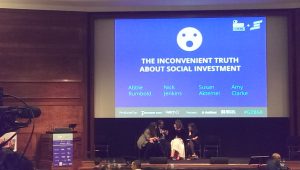
Social investors want spreadsheets and stories. This week’s Good Deals & Beyond Good Business 2018 event
Yesterday I was asked what a “disruptive” business is. Pick one of my four definitions:
Disruptive = overused adjective which hyperbolic and thinking-challenged PRs, swivel-eyed loons and time-starved hacks lazily apply to frequently tedious businesses doing nothing of value or interest. It’s like thinking that if you say you are innovative then you actually are.
Disruptive = a business that decides the rules and regulations everyone else has to follow don’t apply to them. “Hey, why should we adhere to health and safety legislation or, you know, pay our staff? We’re goddam disruptive.”
Disruptive = a business funded by gigantic pots of venture capital (or over-leveraged debt) happy to trade at a loss for years to wipe out competition from independent and ordinary businesses before scooping up customers when they have no alternative.
Disruptive = a business challenging the accepted or orthodox way of doing things to create new or better products or services, or efficiency, or value (financial, social, or other).
I’m fortunate to work with several businesses, social enterprises and other organisations which fit my 4th definition. Phew. But the word itself is overused. What business jargon annoys you? Let me know!
Spreadsheets with stories
I enjoyed Tuesday’s Good Deals & Beyond Good Business 2018 event. This was run by (my client) Pioneers Post (online and print mag for social entrepreneurs, impact investors and leaders of mission-driven businesses, read by over 150,000 people in more than 200 countries) and Hatch (London’s dedicated community enterprise incubator, supporting mission driven entrepreneurs and early stage ventures to launch, grow and scale).
Fantastic programme, including “The Inconvenient Truth about Social Investment” featuring Susan Aktemel of Homes for Good, Tribe Impact Capital’s Amy Clarke and Nick Jenkins of Moonpig. This panel discussed the need for investors (whether they only want a financial return or want to generate financial and social returns) to hear great, emotive stories about their potential investees.
To quote Amy, “Don’t underestimate the power of a story. Investors like to hear about the impact they make. It’s really important to get better at storytelling, an art we have lost, and – in our experience with investors – it is what they crave.”
And Susan, “My way of working is ‘stories and spreadsheets.’ Spreadsheets show people it is rational to support Homes for Good. Stories make them proud of doing so.”
Are you showing your potential customers (or backers, investors, supporters) the genuinely transformative impact of what you do? If not, I can help you.
And if you want to hear more from Susan she’s presenting at (my client) Responsible Finance’s conference next week. Access to affordable finance certainly has a transformative impact on businesses, social enterprises and individuals. Actor and activist Michael Sheen is speaking too. Details here.
Science and Stephen Hawking
Finally, it’s British Science Week. Loads of events all over the UK. And yesterday the world lost a true visionary, Stephen Hawking. Though his legacy of opening up understanding of the Universe, popularising science, widening participation and fantastic sense of humour will never be lost.
Nearly 30 years ago as a physics and maths A-level student (alongside German) I read A Brief History of Time with wonder. Because understanding doesn’t diminish wonder. It enhances it.
What next?
- If you like reading useful, practical advice that’s also entertaining, then you’re welcome to join my free newsletter email list (if you’re not already signed up). Just pop your details in below.
Speak Your Mind